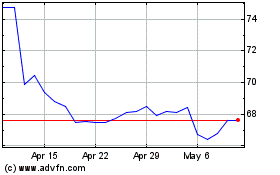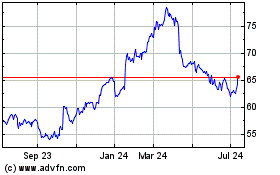Maintenance Suppliers Giving Customers More Than Mops, Buckets
July 05 2011 - 1:21PM
Dow Jones News
W.W. Grainger Inc. (GWW) doesn't mind when its customers sharpen
their pencils on the cost of what Grainger sells.
Grainger is North America's largest distributor of maintenance
and operating supplies to factories, office buildings, hospitals
and other institutions. Grainger, Fastenal Co. (FAST), MSC
Industrial Direct Co.(MSM) and other large supply companies have
been racking up outsized gains in sales and profits lately after
the economic recession prompted their customers to take a closer
look at how they buy cleaning supplies, screws, light bulbs, safety
glasses, step ladders and thousands of other ancillary items.
Companies found they could lower their expenses by trimming
their in-house purchasing agents, reducing the number of suppliers
they use and shifting more orders to larger supply companies with
big product lines and the know-how to manage their customers'
inventories of supplies. The move might not merit much notice in
other industries. But in the dowdy supply industry where small,
regional companies account for about three-quarters of the
industry's $140 billion in annual sales, the shift toward larger
players has been seismic.
"That behavior change is happening in a way that we haven't seen
before," said Grainger Chairman and Chief Executive James Ryan
during an interview with Dow Jones Newswires. "As customers
consolidate their supplier bases, there are winners and losers. For
us, it's been a catalyst for growth. Customers stuck with us during
the downturn and we got a lot of new customers."
Grainger's sales last year grew by 15.4% over 2009 to $7.18
billion, more than double the growth rate of the industrial supply
sector in North America. The company's net income rose 19% to a
record $510.8 million, or $7.05 a share. In 2011, its sales are
expected to expand by nearly 10%, compared with about a 7% increase
forecast for the industry. Analysts expect profit to rise by 20%
from 2010.
Even higher growth rates are anticipated for Fastenal, the
industry's second largest company by sales, and MSC, the sector's
third largest. Both have more exposure to cyclical manufacturing
than Grainger and experienced larger sales declines during the
recession.
For the first nine months of MSC's 2011 fiscal year, net income
is up 50% from 2010 to $159.3 million, or $2.50 a share. Net sales
have grown 21% to $1.49 billion.
"There's still a lot of earnings power left in these
businesses," said Ryan Merkel, an analyst with William Blair &
Co.
The recession left many small and regional supply shops hurting
for the capital to maintain or increase the items they keep in
stock. MSC, which specializes in supplies for metalworking, seized
on this weakness by increasing its sales force, expanding its
product lines and investing in its online sales capacity.
"These investments have enhanced our ability to provide
customers with solutions and services that our smaller, less
capitalized competitors can't offer," said MSC Chairman and Chief
Executive David Sandler during a conference call Friday. "The
fragmented nature of our industry … gives us tremendous runway for
continued growth."
Grainger also has been adding product lines, increasing the
items it stocks to more than 350,000 from 82,000 five years ago.
The Illinois-based company also completed the realignment of its
600 branch stores in 2008, adding more than 1 million square feet
of floor space. Grainger has improved its online order capabilities
and systems for tracking and processing orders.
Grainger estimates companies buy as much as $12 billion a year
worth of maintenance and repair supplies--everything from light
bulbs to sponges--that never get used. The items languish
indefinitely in tool cribs, stock rooms and janitors' closets.
While Grainger and other suppliers benefit from that inefficient
purchasing, Ryan maintains there's an even bigger opportunity in
managing customers' inventories of supplies.
"We can help them get their costs down and they are much more
receptive to that," said Ryan, who joined Grainger in 1980 and has
been CEO since 2008. "We still have to be competitive on the price
[for the items] on the invoice, but more and more customers are
looking at their total procurement costs."
David Ronda, operations manager for Micropump Inc., reduced the
number of local companies in the Portland, Ore., area he ordered
supplies from about two years ago and gave Grainger responsibility
for five categories of maintenance, repair and operations supplies,
or MRO.
Grainger provides the 100,000-square-foot plant with janitorial
supplies; sand paper; gloves and ear plugs; and the components
Ronda's employees use to make test benches for the pumps Micropump
manufactures. Ronda said the move improved the efficiency of his
purchasing and contributed to the nonlabor and noncapital operating
costs for the plant falling to $300,000 last year from $1.1 million
in 2006. Moreover, Ronda's 12-member staff no longer spends time on
filing requisitions because Grainger now manages supply volumes
inside the plant.
"To keep them doing what they do best, I can't have them
ordering parts," Ronda said. "We're not making MRO. It's an
overhead cost."
The test of how much Grainger and other large suppliers have
permanently transformed themselves will likely occur when
industrial growth starts to slow. Maintenance and operations
suppliers are susceptible to the same cyclical downturns as their
customers. Idle plants and smaller work forces need fewer supplies.
Ryan believes Grainger's ability to manage its customers' supply
inventories will make the company more essential to customers
during a slump than a company that just distributes mops and
buckets.
"Grainger has built a business for exactly what's going on in
this industry now," Ryan said.
-By Bob Tita, Dow Jones Newswires; 312-750-4129;
robert.tita@dowjones.com
Fastenal (NASDAQ:FAST)
Historical Stock Chart
From May 2024 to Jun 2024

Fastenal (NASDAQ:FAST)
Historical Stock Chart
From Jun 2023 to Jun 2024
